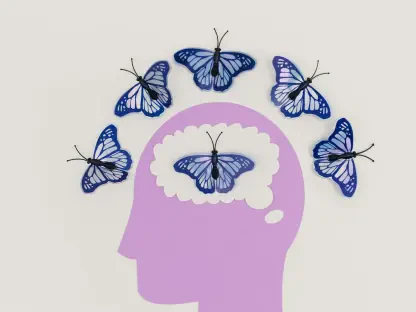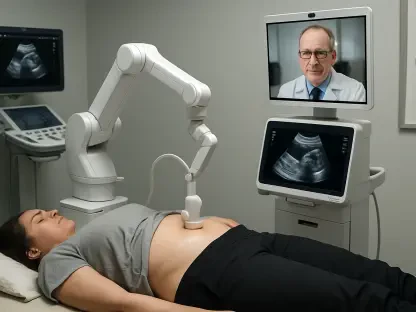The healthcare landscape is undergoing a massive transformation with the advent of Artificial Intelligence (AI) and the Internet of Medical Things (IoMT). These cutting-edge technologies are not just buzzwords; they are reshaping how chronic and terminal diseases like cancer, heart failure, cardiovascular ailments, kidney diseases, and Alzheimer’s are managed, diagnosed, and treated. The integration of AI and IoMT promises a future of personalized treatment, early disease detection, and continuous patient monitoring.
The Dawn of Precision Diagnostics
AI-Powered Diagnostic Tools
Traditional diagnostic methods have long struggled with accuracy and consistency, often relying too heavily on subjective clinical observations. Today, AI-driven technologies, including advanced laboratory assays and medical imaging, have stepped in to fill these gaps. Algorithms like Convolutional Neural Networks (CNNs) can analyze complex imaging data with unprecedented precision. For instance, CNNs have been shown to identify early signs of lung cancer that human eyes might miss, highlighting the power of machine learning in diagnostics. This leap in diagnostic precision directly translates into earlier and more effective treatments, potentially lowering mortality rates associated with terminal diseases.
This shift toward AI-powered diagnostics marks a significant departure from traditional practices. It opens new avenues for early intervention, thereby enhancing patient outcomes. AI algorithms are capable of sifting through vast amounts of data to identify patterns that are often invisible to human practitioners. This ability to process and analyze complex datasets with high accuracy is invaluable. Moreover, AI models are continually learning and improving, adapting to new information and evolving to deliver even more accurate diagnoses. As these technologies become increasingly integrated into clinical settings, they hold the promise of transforming not only how diseases are detected but also how they are understood.
Enhancements in Imaging and Prediction
AI not only improves image analysis but also offers predictive capabilities. Models like Long Short-Term Memory (LSTM) Recurrent Neural Networks (RNNs) can process time-series data to predict disease progression in chronic patients. This kind of detailed, predictive analytics facilitates not only accurate diagnosis but also preemptive medical intervention, potentially saving lives and reducing long-term healthcare costs. By leveraging historical data, these models can forecast disease trajectories, allowing healthcare providers to tailor treatment strategies that mitigate risks and enhance patient care.
The predictive power of AI extends beyond immediate diagnostic capabilities. It enables clinicians to make informed decisions about the most effective treatment plans, tailored to the specific needs of each patient. This predictive capability is especially crucial in managing chronic diseases, where early intervention can significantly alter the disease course. With AI, doctors can proactively address potential complications, reducing the need for emergency interventions. In the long run, this proactive approach can lead to more efficient healthcare systems, lower costs, and, most importantly, improved patient experiences. The ability to predict and prevent adverse health outcomes represents a paradigm shift in chronic disease management.
Personalizing Treatment Plans
Continuous Health Monitoring
One of the most revolutionary aspects of IoMT is its ability to enable continuous patient monitoring through connected devices. These devices collect real-time health data, providing a comprehensive picture of a patient’s condition over time. Wearable devices, for example, can track heart rate and glucose levels, feeding data back to healthcare providers who can then tailor treatment plans to the individual needs of each patient. This continuous flow of data enables a dynamic, responsive approach to healthcare, where interventions can be adjusted in real-time based on the patient’s current status.
This continuous health monitoring is particularly beneficial for managing chronic diseases. Patients with conditions like diabetes or heart disease require constant surveillance to prevent complications. IoMT devices offer a seamless solution for this ongoing monitoring. Real-time data allows healthcare providers to detect anomalies early, ensuring that patients receive timely interventions. This proactive approach can prevent more severe health episodes, reducing hospitalizations and improving the overall quality of life for chronic disease sufferers. The integration of IoMT in healthcare represents a major advancement in how patient data is collected and utilized, fostering a more personalized and effective healthcare experience.
Tailoring Interventions
Personalized medicine is becoming a reality thanks to AI and IoMT. By analyzing data collected from various IoMT devices, machine learning models can recommend customized treatment plans that are more effective than traditional one-size-fits-all approaches. These tailored interventions can significantly improve patient outcomes, offering a higher quality of life for those suffering from chronic diseases. Personalized treatment plans consider a multitude of factors specific to each patient, including genetics, lifestyle, and ongoing health data, to create a more comprehensive and effective care strategy.
This move towards personalized treatment is a game changer in chronic disease management. It shifts the focus from generic treatments to highly individualized care protocols. AI algorithms analyze a wealth of data to understand how different patients respond to various treatments. This analysis can reveal patterns that would be impossible to discern through traditional methods, enabling doctors to craft treatments that are uniquely suited to each patient’s needs. The result is a more efficient and effective care process, reducing trial-and-error in treatment plans and potentially improving recovery rates and long-term health outcomes.
Overcoming Data Security Challenges
Ensuring Data Privacy
While the benefits of AI and IoMT are immense, they come with significant challenges, particularly concerning data privacy and security. With the vast amount of sensitive health data being collected, the risk of data breaches is real. Ensuring robust encryption methods and secure data transmission mechanisms is crucial to protecting patient information. Blockchain technology is being explored as a potential solution to enhance the security of health data. Blockchain’s decentralized nature means that data can be stored and shared securely, minimizing the risk of unauthorized access and tampering.
Addressing these privacy concerns is paramount for the successful integration of AI and IoMT in healthcare. Healthcare providers must adhere to strict regulatory requirements and implement advanced security protocols to safeguard patient data. Solutions such as multi-factor authentication, data anonymization, and regular security audits are essential steps in this process. By prioritizing data privacy, healthcare systems can build trust with patients, who must feel confident that their sensitive information is protected. Trust is a fundamental component in the widespread adoption of AI and IoMT, as these technologies rely heavily on extensive data analysis to deliver accurate and personalized care.
Secure Data Transmission
Another critical issue is the secure transmission of data across different platforms. Technologies like federated learning are being investigated to allow for the sharing of health data without compromising privacy. This approach enables the training of machine learning models on decentralized data, thereby reducing the risks associated with data centralization. Federated learning brings the added benefit of enhancing the robustness and accuracy of AI models by leveraging diverse datasets while maintaining stringent privacy safeguards.
The secure transmission of data is essential for the seamless functioning of IoMT ecosystems. Different devices and platforms need to communicate effectively to provide a holistic view of patient health. This interconnectivity is crucial for continuous monitoring and timely interventions. Ensuring data integrity and confidentiality during transmission is paramount to maintaining the reliability of these systems. Innovative encryption techniques and secure communication protocols are being developed to address these challenges, paving the way for more secure and efficient healthcare solutions. The goal is to create a secure infrastructure where data flows seamlessly yet remains protected at every stage.
The Role of Advanced AI Models
Machine Learning in Disease Prediction
Machine learning models like XGBoost and CNNs have already shown remarkable success in predicting and diagnosing various diseases. These models excel in handling complex datasets, providing highly accurate diagnostic outcomes. For instance, in cardiovascular disease prediction, XGBoost models have achieved over 98% accuracy, demonstrating the efficacy of these advanced algorithms in clinical settings. Their ability to process vast amounts of health data and extract meaningful insights makes them invaluable tools in modern medicine.
These advanced AI models are transforming how diseases are predicted and managed. By leveraging sophisticated algorithms, healthcare providers can make more informed decisions, leading to better patient outcomes. The high accuracy rates of these models are particularly beneficial in early disease detection, where timely intervention can make a substantial difference in patient prognosis. As these technologies continue to evolve, they promise to bring even greater precision and reliability to disease prediction, making healthcare more proactive and preventative.
Addressing Model Challenges
Despite their high accuracy, these models are not without challenges. Issues like data variability and model overfitting can compromise their reliability. Ongoing research aims to refine these models, enhancing their generalizability and making them more robust in the face of diverse, real-world data. Efforts are also being made to improve model explainability, ensuring that healthcare providers can trust and understand the recommendations made by AI systems. Improved explainability is crucial for the practical implementation of these technologies in clinical settings, where doctors need to comprehend AI-driven insights clearly.
Addressing these challenges is essential for the widespread adoption of AI in healthcare. Researchers are working on techniques to mitigate overfitting and handle data variability effectively. By creating more generalizable models, they aim to ensure that AI systems perform reliably across different patient populations and healthcare settings. This work is crucial for building confidence in AI technologies among healthcare practitioners and patients alike. Enhanced explainability and reliability will enable more effective collaboration between humans and machines, ultimately leading to better patient outcomes and more efficient healthcare delivery.
Future Directions and Research
Expanding Multi-Disease Models
The future of AI and IoMT in healthcare involves developing multi-disease models capable of managing several conditions simultaneously. Current research is focused on creating comprehensive models that can handle the complexity of multi-morbidity, providing a more holistic approach to patient care. These multi-disease models aim to account for the interactions between different conditions, offering more nuanced treatment strategies tailored to individual patient needs. This holistic approach can significantly improve the management of patients with multiple chronic conditions.
This push towards multi-disease models represents a significant advancement in personalized medicine. By addressing the complexities of multi-morbidity, these models can offer more effective and individualized care plans. Researchers are leveraging advanced machine learning techniques to develop models that can comprehend and predict the interactions between various diseases. This research aims to create a more comprehensive understanding of patient health, enabling healthcare providers to deliver more targeted and effective treatments. The ultimate goal is to enhance patient outcomes by providing care that is as multifaceted and dynamic as the human body itself.
Enhancing Interoperability and Standards
The healthcare field is experiencing a significant transformation thanks to the advent of Artificial Intelligence (AI) and the Internet of Medical Things (IoMT). These state-of-the-art technologies go beyond mere buzzwords; they are revolutionizing how chronic and terminal illnesses, such as cancer, heart failure, cardiovascular diseases, kidney disorders, and Alzheimer’s, are diagnosed, managed, and treated. By harnessing the power of AI and IoMT, healthcare providers can now offer personalized treatment plans, detect diseases earlier, and continuously monitor patients’ health.
AI systems analyze vast amounts of data quickly, identifying patterns that might go unnoticed by human professionals. This capability is invaluable in diagnosing conditions at an early stage when intervention can be most effective. For instance, AI algorithms can scrutinize medical scans to detect cancerous cells long before they become visible to the naked eye. Meanwhile, IoMT devices, ranging from wearable monitors to smart implants, track vital signs in real-time, sending critical data directly to healthcare providers. This continuous monitoring ensures timely responses to any abnormalities, improving patient outcomes.









